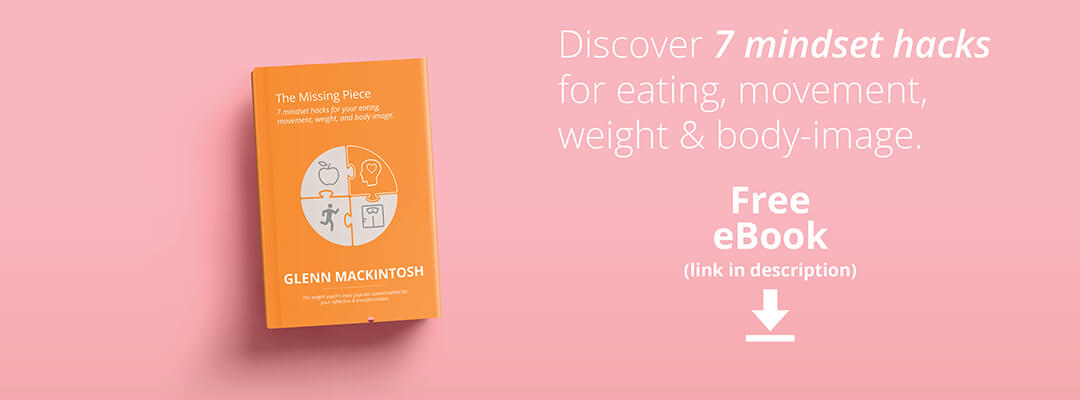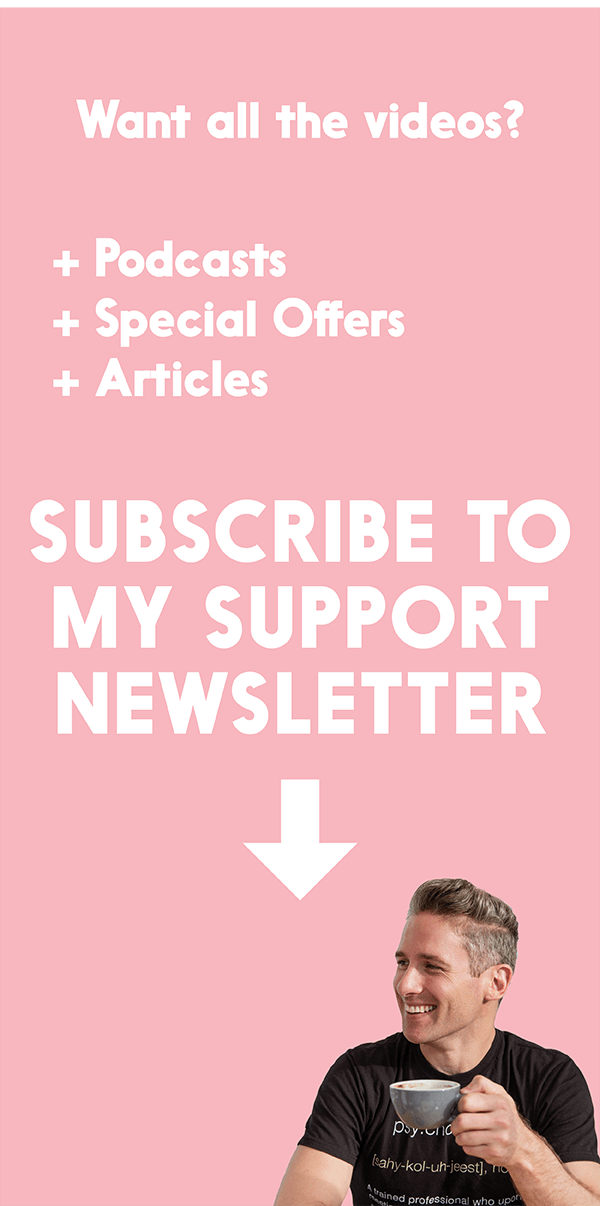
In this Thursday Therapy episode, The “Weight Psych” Glenn Mackintosh talks you though his first thoughts on overcoming a range of common exercise barriers, such as feeling “too fat”, being tired, busy, and not having time, through to aches and pains, self-sabotage, and simply not enjoying exercise!
Watch Video
I created this video for people just like you.
If you found it valuable, please help me share it with them!
LINKS FROM VIDEO
TT #12 I Hate Exercise? 5 Psychological Tips to Turn Your Mind Around: http://bit.ly/2bqxnuT
SASSOM Fitness and MMA: http://bit.ly/2fGp1xU
Fahey’s Boxing Studio: http://bit.ly/2fhWOiI
Fortitude Fitness: http://bit.ly/2fGlcLn
Alliance BJJ: http://bit.ly/2eGBj73
Shindo: http://bit.ly/2fGrCXj
Gamebred Academy: http://bit.ly/2fhWUH6
SHOW NOTES
- Viewer question “I’m too fat to exercise!” [01:43]
- Viewer question on how to keep motivated when you’re studying and are tired. [04:11]
- Viewer question on getting aches and pains every time she decides to exercise. [06:48]
- On negative attitudes to exercise. [07:56]
- On your mind unconsciously resisting exercise. [08:38]
- Viewer question on finding the right exercise for her arthritic knees. [10:27]
- Summing up and finding the right support for you. [12:00]
TRANSCRIPT
Hi everyone, welcome to Thursday Therapy. I’m Glenn Mackintosh, the weight psych, and today we’re answering a whole bunch of questions on barriers to exercise. Hey everyone, welcome to Thursday Therapy. I hope you’re doing okay with your mindful eating from our last episode and also, I want to give a quick thank you, thank you, thank you to everyone who liked our new public figure page, over 600 likes in the first week, so that is absolutely awesome and before we go on, a few people have been asking us if you don’t have a Gmail or if you don’t have a YouTube account, how do you sign up for these videos.
So, we’ll provide a link to our newsletter where you get the Thursday Therapy videos special offers that are just for our newsletter and you get my blog when I get around to writing it. What we’re going to do today is, we’re going to answer a whole bunch of questions for more common barriers to exercise to some kind of interesting ones and I’m just going to give you my first reactions and see if you can shake up your own thoughts on your barriers to exercise and come to an answer that’s right for you.
So, the first question comes from Sarah who asks, “Glenn, I want to exercise but I’m too fat. Help!” Alright, Sarah, I’ve got a couple ideas for you but all of my clients who also ask those day therapy questions, you’ve got to be mindful that I kind of know a bit about you, so let’s get to answering your question. So, first thing, Sarah, you’re actually not too fat and I know this because sometimes you exercise and sometimes you don’t, so if you were too fat to exercise then you wouldn’t actually be able to exercise.
This is a really good point for everyone else though because what I want you to think about is whether your body weight is holding you back from doing a particular activity or whether it’s your body image so if you’ve got an exercise that you’d like to do or you think it’d be good for you and you’ve got this mental barrier, I want you to just ask, is my weight holding me back and if it is, then please don’t do it or is it my body image of my concerns about my body my worries about what other people will think and if that’s the case I would encourage you to go ahead and do it.
An example might be, let’s say, trampolining, I don’t know anything about trampolining but say you go to go trampolining and you weigh 110 kilos and the weight limit is 100 kilos, then you’re too heavy for it, so it’s your body weight that is actually holding you back there, so I wouldn’t do that but if it’s more about your body image, so maybe the way that you’re fat will jiggle when you’re bouncing up and down on the trampoline then I would encourage you to overcome that as an excuse and go anyway.
The second thing I want to talk about quickly is other people’s opinions. So, firstly, so many people out there are so consumed in themselves they don’t even notice you but even if they do notice you, you don’t know what sort of response they could have, they could have a really neutral response, a really positive one or really negative one and what I would say to you is that it really doesn’t matter, it’s just an opinion, so we want to start to let go of the power that other people’s opinions can have over us and that’ll allow us to be more self-expressed. Do what we want to do, be the sort of people that we want to be and get the results that we want to get for ourselves.
The next question comes from Astrid who asks, “How possibly could you keep motivated and on to daily training when it’s so hard to keep on track at uni and you basically spend full time studying. I get really tired by the end of the afternoon and starving by the time I get home and eat, I run out of time and it’s already 9 p.m. if I do train really hard I become pretty exhausted, slow and have migraines the next day at uni. I used to be quite fit physically and now that I’m trying to get back to that it seems pretty hard to achieve.” This is an excellent question, Astrid. I see a lot of people who have time issues, whether it’s due to family or work or study or some issue like that, so let’s get to answering it. Okay, my first thought, is start small, say for example, if you tried to do six 15-minute walks, that’s an hour and a half over the week and that’s an hour and a half more than 0 minutes.
So, any exercise you can do I would count that as good, don’t be so black-and-white and smaller chunks of exercise will be a lot easier to fit in than larger chunks. You will find when you’re starting a lot of people get a bit of a dip in their energy which is obviously a high-risk time for stopping their exercise just in the first two or three weeks when they start, so you can really avoid that dip in energy if you do start slow. So, for a couple of reasons there, first making it in so you can get the time to do it and secondly for your energy levels which are obviously important especially when you’re busy just break it into really small chunks and be happy with that for now.
The other thing is Astrid, I don’t know whether you’re doing this but it’s really good to cover because I know a lot of people do, do this is I heard in there that you may be comparing yourself to your past self, which is a really problematic thing to do especially if you used to be really fit. Oscar Hamling said that often the greatest enemy to present happiness is past happiness too well remembered and I think that’s certainly the case of physical activity. I know it’s the case for me, when I go to my martial arts gym and I get caught up in, oh my goodness I used to be able to kick really high, I used to be able to lift that big heavy thing, I used to be able to run this fast on the treadmill, it really is quite a downer and I don’t enjoy my session as much but when I manage to stay in the moment just enjoy the practice and the movements of what I’m doing in the here and now, then it’s much more enjoyable and paradoxically I get better.
The next question is a really interesting one from, Ray who asks, “I want to know why every time I decide to exercise, all of a sudden I have aches and pains that keep me from doing it.” Interesting one, Ray, I would question as to whether there’s some sort of psycho-physiological sabotage going on. This is a really important point for Thursday Therapy. I’m here to support you guys and I have a lot of general advice that can be really helpful but I also want to let you know when your question goes beyond the scope of what I can answer. So, for this Ray, what I would really love to do, is to refer you to a trusted mental health professional, to a psychologist or a counsellor or a psychiatrist who can help you work through and unpack if there is any reasons why your body is responding this way, if that’s what’s going on. Having said that, let me give you a couple of ideas of what I commonly see with some of the people that I work with and this can start you on your journey.
Firstly, it could just be that you have a negative attitude towards exercise and that attitude is causing some of the aches and pains I’m not saying that the aches and pains don’t have a basis in your body in your anatomy in your physiology but the attitude can exacerbate those pains let me give you an example, I really hate doing outside housework like gardening, painting, I’ve done more than my fair share of it, so when there comes an opportunity for me to do it, I kind of feel like all tired and lethargic, it’s a psychophysiological response, my attitude towards that type of work makes me kind of sleepy and flat.
So, it could be that that’s what’s happening with you and exercise. Also, it may be worth reflecting on whether your mind is resisting exercise for some other underlying reason, this could be a whole variety of things; it could be that you have a fear of failure, a lot of people that I see you have done a lot of yo-yo dieting have this fear of failure which kind of makes sense because if you haven’t long-term success before, you’re naturally going to doubt that you’re going to have long-term success in the future, so there could be something going on there.
Alternatively, there may be some type of fear of success, this is also reasonably common although we don’t talk about it as much, we’re sort of sold this idea that when we lose weight when we start exercising that only good things happen but of course that’s not the reality for everyone, so what I would encourage you to do is ask yourself there, what is the downside of me becoming a regular exerciser, if it’s related to weight in your mind, what is the downside of me losing weight. Certain things might come up like, if I exercise more I won’t spend as much time with my family or if I don’t have that problem, I don’t know who I am anymore, I’ve been labelled with this problem and sort of identified with it for so long, I don’t know what it would be like to be free of the problem or it might be about weight loss, if I lose weight I’m suddenly going to start getting attention and I don’t know how I’m going to deal with that but the important thing is to ask yourself, what is the downside of me reaching this goal and that might give you some important clues to work through.
The last question comes from Josie, who asks, “I have bad arthritic knees which makes it difficult to get excited about exercise. I’ve tried pull work, walking and weight training but can’t seem to get overly excited about any form of exercise, mostly because of the pain factor but if I’m honest, also, because I’m just not into exercise I start something and then find a reason to stop please help me find the right exercise for me and the motivation to keep going once I get started.” I think it’s important that we as health professionals are real with you and I think it’s important that you’re real with yourself. We all know that physical activity is wonderful for your body, it’s wonderful for your psychological health but not everyone is going to fall passionately in love with exercise.
For some people, you’re just not going to get that endorphin high that other people seem to speak of, for some people you’re not going to be going about your daily tasks fantasizing about the run you’re going to do that afternoon, it’s just not going to be you and I think we make that okay, so for some people, if you can’t get there find the exercise that you dislike the least and rather than requiring of yourself to enjoy it, place it somewhere in your mind as an important life task that you’re committed to. If I use myself as an example, I’m quite lucky there’s a whole bunch of exercise that I really enjoy, I like going for a run, I like my martial arts training but one activity that I really don’t like it all is doing my physiotherapy exercises, so I put that in my mind as something that I’m committed to doing because I know it’s important for me and don’t require that it’s my favourite part of the day.
The last thing here and this can be really important for anybody who’s really struggling to move their bodies, is to get support. So, if it’s not your favourite thing maybe a walking buddy, maybe a group that you can commit – or maybe a personal trainer is a really good option for you. We’ve got personal trainers at weight management psychology and some of our clients just use them for a period of six to twelve months before they branch out into other things, some stay with our PTs for ages and ages and just build a really positive relationship and some go with our PTs for a while and then branch out and do a bit of both, but finding the right support for you can help you stay committed to the movement that is probably really important no matter where you are in your health journey.
So, I hope you’ve benefited from these ideas and if we haven’t quite gotten to the answer for you, we’re going to do another Thursday Therapy first, we’re going to do some group therapy, so if there’s a barrier that you can’t yet figure out how you’re going to overcome it, comment below and guys let’s help that person find the right answer for them.
Quick shout out before we finish to all the people that I’ve enjoyed training with, from Marcus Collings and the family at SASSOM fitness and MMA, to Bennie Wieland my boxing coach, Bennie I know you’ll be tuning in because Bennie loves Thursday Therapy, to Andrew Keogh, who I kick box with that fortitude fitness and Bruno Lemus from Alliance BJJ to Kerry all the crew down at Shindo and Brendon and all the crew up here at game bred, I hope I haven’t missed any one out because, you know, everyone there is as scary as they are lovely but for me the martial arts is the most beautiful moving meditation and my favourite celebration of our body’s ability to move, so I really feel blessed to have connected with you and shared that journey with you. Guys, as always if you find anyone that that you know really struggles with exercise, this can be a beautiful Thursday Therapy to share with them because I do know that it is really tough for a lot of people and of course if you haven’t already, subscribe to Thursday Therapy for regular videos of me. Enjoy finding your way through your particular barriers and coming up with a more enjoyable, sustainable workable way of moving your body.





